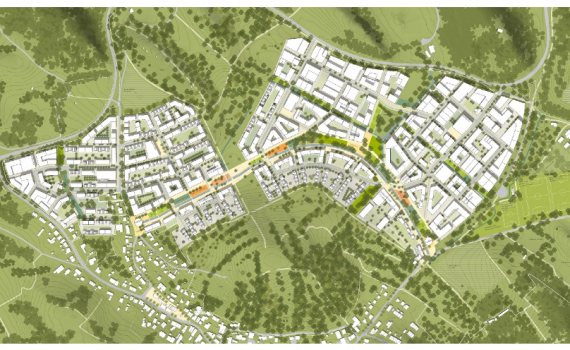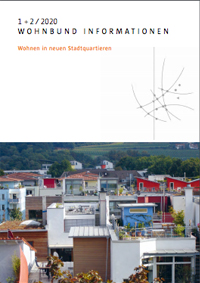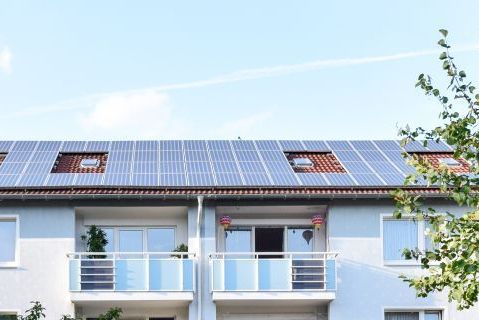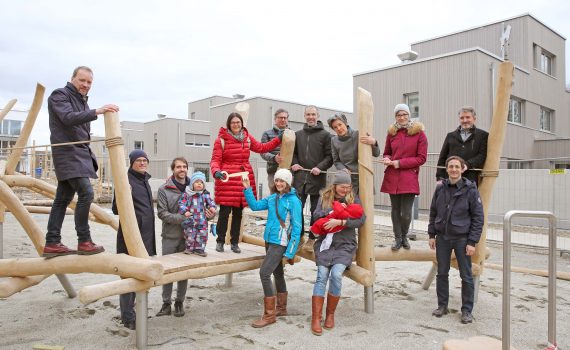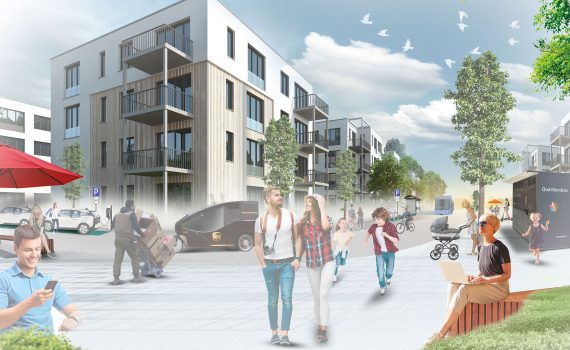Kategorie für Blog: Communities
Proven work aid and at the same time standard work for climate protection work in municipalities can be used digitally in future. Difu, ifeu and Climate Alliance developed the guide on behalf of the BMWK.
The "Climate Adaptation Check" is a new orientation aid for NRW municipalities. The federal state passed the first climate adaptation law in Germany in 2021. The check supports NRW municipalities in implementing the new requirement for consideration. Berlin/Cologne. The consequences of climate change have long been felt in German municipalities: more frequent heavy rainfall events, flooding, storms as well as heat waves and prolonged drought. Cities, [...]
Thüga closed the 2021 financial year with a good result. The approximately 100 municipal utilities and regional suppliers of the Thüga Group fully fulfilled their supply mandate and continued to drive forward the energy turnaround despite burdensome general conditions.
The cities propose to strengthen and accelerate local climate protection through a new financial support system. The German Association of Cities today published a concept and a publication on its website.
The German Association of Cities, the Global Parliament of Mayors and the international cities network ICLEI have joined forces to form a Cities Alliance to accompany the German G7 Presidency. The alliance is organising a conference on Tuesday, 3 May a U7 Mayors Summitwhich brings together high-ranking representatives of cities from the G7 countries. Representatives of the media are invited to follow the event virtually. The international dialogue will take place under the heading "Engaging the Urban World - Cities as Engines of Change for Peace, Democracy and Sustainability".. It is the most important event of cities in the framework of the German G7 Presidency. A joint declaration by the cities will also be adopted: In the „Urban7 Mayors Declaration“ the city leaders from the G7 countries will present their expectations of politics and business in order to meet the global challenges on the ground.
Recommendations from the BMBF project "Urban Heat Transition" were published: ► Consistently tapping alternative heat sources such as wastewater heat ► Convert public buildings to renewable heat and create neighbourhood heating networks ► Ambitious energy refurbishment in neighbourhood conservation areas to keep rents affordable
[caption id="attachment_28516" align="alignleft" width="560"] Award-winning project "Stadt Landschaft Burg" of the Federal Prize 2020 - © Bundespreis Stadtgrün / Hergen Schimpf[/caption]
The Federal Ministry of Housing, Urban Development and Building today announced the Federal Urban Green Award 2022. This year, the focus is on the topic of "Climate adaptation and quality of life".
Federal Minister Klara Geywitz: "Climate change is a stress test for our cities. We need more trees for a better urban climate, we need soils that can absorb heavy rainfall, we need less sealed surfaces for more biodiversity and to prevent residential neighbourhoods from heating up. With the Federal Urban Green Award 2022, we are honouring the pioneering work that is already shaping the necessary transformation of cities."
Award-winning project "Stadt Landschaft Burg" of the Federal Prize 2020 - © Bundespreis Stadtgrün / Hergen Schimpf[/caption]
The Federal Ministry of Housing, Urban Development and Building today announced the Federal Urban Green Award 2022. This year, the focus is on the topic of "Climate adaptation and quality of life".
Federal Minister Klara Geywitz: "Climate change is a stress test for our cities. We need more trees for a better urban climate, we need soils that can absorb heavy rainfall, we need less sealed surfaces for more biodiversity and to prevent residential neighbourhoods from heating up. With the Federal Urban Green Award 2022, we are honouring the pioneering work that is already shaping the necessary transformation of cities."
After years of separating living and working, production in the city was lost from view, outsourced from the cities. The productive city is currently the subject of intense debate, triggered by changes in production methods and new possibilities for a mix of uses. There is still a lack of nationwide studies and data analyses, especially with regard to employment effects and spatial differentiation.
 With a very large majority, the municipal council decided on 22.07.2021 to initiate the urban development measure (SEM) "Nördlich Hafner". The development statute provides the project with a binding legal framework for the city of Constance and the remaining property owners in the area. The decision is also the conclusion of the preparatory studies (VU) that have been running for about four years, in which not only various subject-related studies and the urban development framework plan were developed, but also a comprehensive timetable and a detailed cost and financing overview were drawn up. The development of the approx. 106 ha area (of which approx. 60 ha are residential areas) including all technical and social infrastructures (e.g. day-care centres, primary school) will cost a total of almost 420 million euros. Income from the allocation of land will ultimately result in a largely balanced overall balance.
With a very large majority, the municipal council decided on 22.07.2021 to initiate the urban development measure (SEM) "Nördlich Hafner". The development statute provides the project with a binding legal framework for the city of Constance and the remaining property owners in the area. The decision is also the conclusion of the preparatory studies (VU) that have been running for about four years, in which not only various subject-related studies and the urban development framework plan were developed, but also a comprehensive timetable and a detailed cost and financing overview were drawn up. The development of the approx. 106 ha area (of which approx. 60 ha are residential areas) including all technical and social infrastructures (e.g. day-care centres, primary school) will cost a total of almost 420 million euros. Income from the allocation of land will ultimately result in a largely balanced overall balance.
Building culture is becoming a recognised goal in the real estate industry: with support from the real estate and housing industry, the Institute for Corporate Governance in the German Real Estate Industry (ICG) and the Federal Foundation for Building Culture initiated and developed the Code for building culturea voluntary commitment for the responsible performance of tasks by companies in the real estate industry.
On 22.12.2020, the Senate passed the first legal ordinance on the Hamburg Climate Protection Act. This regulates the concrete implementation of the solar roof obligation and the integration of renewable energies when replacing heating systems. With these regulations, Hamburg is one of the pioneers in climate protection in the building sector nationwide.
How can Bonn become climate neutral by 2035? This is the question that the participatory project "Bonn4Future - We for the Climate!" would like to discuss together with Bonn citizens over the next two years. Since mid-2019, the climate emergency has been in effect in Bonn; in November 2019, the Council decided that Bonn should become climate neutral by 2035. The city and the non-profit association Bonn im Wandel have now signed a cooperation agreement and thus launched "Bonn4Future".
Constance receives project funding for "Hafner KliEn" from the 7th Energy Research Programme of the Federal Government The city of Constance is striving for sustainable urban development. This should include consideration of the triad of sufficiency, efficiency and substitution in the area of energy policy decisions and climate protection. This also and especially applies to the new city district [...].
 The ecological model settlement on a former barracks site in Munich sets new standards in timber construction. Various timber construction methods and building types up to seven storeys are being tested side by side in eight building projects with the aim of a final scientific evaluation. Timber frame, timber frame and timber hybrid construction methods are being used.
The ecological model settlement on a former barracks site in Munich sets new standards in timber construction. Various timber construction methods and building types up to seven storeys are being tested side by side in eight building projects with the aim of a final scientific evaluation. Timber frame, timber frame and timber hybrid construction methods are being used.
Around 60 percent of the resources used in Berlin are processed in the construction industry. This contrasts with millions of tonnes of building rubble and construction site waste. Every year, 2.2 million tons of primary raw materials are already saved in civil engineering and building construction in Berlin through the use of quality-assured secondary raw materials. But Berlin does not intend to stop there. By 2030, a further 1.4 million tonnes of primary materials are to be replaced by secondary raw materials each year.
Following the interim results of the Housing Summit and the Building Land Commission, demands are being voiced by the scientific community: The still tight housing markets require the use of additional instruments by the federal and state governments. Otherwise, the turnaround towards affordable housing cannot be achieved.
18 minute radio report from 23.06.2020 by Josephine Schulz in the media library of Deutschlandfunk: www.deutschlandfunk.de/oeffentliche-auftraege-wie-der-staat-fair-einkaufen-will.724.de.html?dram:article_id=479176 The demand for sustainable products can be increased through municipal procurement. Positive examples but also the problems of sustainable procurement are discussed in the article. Buildings and larger properties are not explicitly mentioned, but the principles basically apply there as well.
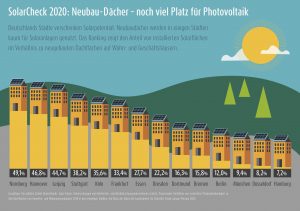 Good news for the PV industry: The solar cap will be abolished and solar expansion will be further promoted. The photovoltaic potential in Germany is enormous - especially when it comes to using roof space on new buildings. The new LichtBlick SolarCheck now shows in detail how well the 14 largest German cities are currently exploiting this potential. Enormous differences are revealed: While Nuremberg (49.1%) and Hanover (46.8%) exploit almost half of their potential, Munich and Düsseldorf do not even reach the 10 percent hurdle. The absolute taillight: the Hanseatic city of Hamburg with only 7.2 percent - one more reason for the solar obligation for new buildings planned by the mayor's office.
Good news for the PV industry: The solar cap will be abolished and solar expansion will be further promoted. The photovoltaic potential in Germany is enormous - especially when it comes to using roof space on new buildings. The new LichtBlick SolarCheck now shows in detail how well the 14 largest German cities are currently exploiting this potential. Enormous differences are revealed: While Nuremberg (49.1%) and Hanover (46.8%) exploit almost half of their potential, Munich and Düsseldorf do not even reach the 10 percent hurdle. The absolute taillight: the Hanseatic city of Hamburg with only 7.2 percent - one more reason for the solar obligation for new buildings planned by the mayor's office.
The parliament of Bremen wants to oblige the use of solar energy on all new and existing buildings in Bremen and Bremerhaven. Whenever the roof surface is completely renewed, they are to be equipped with a solar system in the future. This is photovoltaics and, if necessary, also solar thermal energy. The Senate is currently examining the latter.
 Now that almost all 570 flats in Germany's largest timber-built housing estate in Prinz-Eugen-Park have been occupied, the Munich planning committee has recommended realising the timber-built follow-up project "Kreativquartier" with 370 residential units.
Here are the key data:
http://sdg21.eu/db/kreativquartier
Now that almost all 570 flats in Germany's largest timber-built housing estate in Prinz-Eugen-Park have been occupied, the Munich planning committee has recommended realising the timber-built follow-up project "Kreativquartier" with 370 residential units.
Here are the key data:
http://sdg21.eu/db/kreativquartier
 Berlin/Cologne. Climate protection and adaptation to the consequences of climate change will become increasingly important for cities. This is one of the findings of the survey of (Lord) Mayors of large German cities* conducted by the German Institute of Urban Affairs in January and February 2020. Almost two-thirds of the respondents named climate protection as an important municipal issue for the future. This means that the number of mayors who attribute an increase in importance to this field of municipal policy action has more than tripled compared to the previous year. Future surveys will show how strongly this result was influenced by the protests of the 'Fridays for Future' movement.
Berlin/Cologne. Climate protection and adaptation to the consequences of climate change will become increasingly important for cities. This is one of the findings of the survey of (Lord) Mayors of large German cities* conducted by the German Institute of Urban Affairs in January and February 2020. Almost two-thirds of the respondents named climate protection as an important municipal issue for the future. This means that the number of mayors who attribute an increase in importance to this field of municipal policy action has more than tripled compared to the previous year. Future surveys will show how strongly this result was influenced by the protests of the 'Fridays for Future' movement.
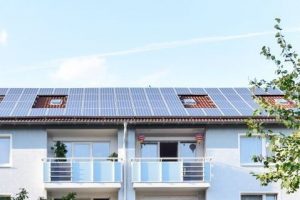 In Vienna, as a rule, no residential building may be erected without a solar system in the future. This is stipulated in an amendment to the building code, which is currently being evaluated, the red-green city government informed on Monday. Currently, such a photovoltaic obligation applies only to industrial buildings.
In Vienna, as a rule, no residential building may be erected without a solar system in the future. This is stipulated in an amendment to the building code, which is currently being evaluated, the red-green city government informed on Monday. Currently, such a photovoltaic obligation applies only to industrial buildings.
 From the meeting of the Senate on 10 March 2020:
The Senate today adopted a comprehensive catalogue of measures to accelerate the expansion of solar energy in Berlin, following a proposal by the Senator for Economics, Energy and Public Enterprises, Ramona Pop.
Senator Pop: "The potential study for the Solarcity Masterplan has shown that we can harvest 25 per cent of the electricity generated with solar energy from Berlin's rooftops. We must therefore accelerate the expansion of solar energy in the city. It is necessary for the federal government to finally improve the legal framework for solar energy in cities. Nevertheless, we want to actively utilise the available scope at state level. With the Solarcity Masterplan, we will expand information and advice, provide incentives and also examine regulatory instruments. The implementation of the Solarcity Masterplan is a joint task for the Senate, but also for all Berlin stakeholders from business and society."
From the meeting of the Senate on 10 March 2020:
The Senate today adopted a comprehensive catalogue of measures to accelerate the expansion of solar energy in Berlin, following a proposal by the Senator for Economics, Energy and Public Enterprises, Ramona Pop.
Senator Pop: "The potential study for the Solarcity Masterplan has shown that we can harvest 25 per cent of the electricity generated with solar energy from Berlin's rooftops. We must therefore accelerate the expansion of solar energy in the city. It is necessary for the federal government to finally improve the legal framework for solar energy in cities. Nevertheless, we want to actively utilise the available scope at state level. With the Solarcity Masterplan, we will expand information and advice, provide incentives and also examine regulatory instruments. The implementation of the Solarcity Masterplan is a joint task for the Senate, but also for all Berlin stakeholders from business and society."
 City Planning Councillor Professor Dr. (l) Elisabeth Merk has now symbolically handed over the key to the members of the "Der Kleine Prinz" building association in Munich's Prinz Eugen Park. Their new building ensemble of atrium and point houses on Jörg-Hube-Strasse is part of the ecological model settlement there. In addition to apartments, two guest apartments, an ice cream café and a bicycle repair shop were built.
City Planning Councillor Professor Dr. (l) Elisabeth Merk has now symbolically handed over the key to the members of the "Der Kleine Prinz" building association in Munich's Prinz Eugen Park. Their new building ensemble of atrium and point houses on Jörg-Hube-Strasse is part of the ecological model settlement there. In addition to apartments, two guest apartments, an ice cream café and a bicycle repair shop were built.
A further 700,000 euros will be available for #moinzukunft cargo bikes from 1 April. Up to 2,000 euros in subsidies are possible for the purchase of a new e-load bike and 500 euros for normal load bikes.
From 2022, all new public buildings must be made of at least 50 per cent wood or other sustainable building materials. For buildings with more than eight storeys, the supporting structure must even be made entirely of wood. It was also decided that 90 ecological neighbourhoods and 100 urban farms will be built in Paris.
Thuringia is making six million euros available this year for investments in municipal climate protection. The funding comes from the state's "Klima Invest" programme, which has already provided more than 15.5 million euros in investments in municipalities since the beginning of 2018, as the Ministry of the Environment announced in Erfurt on Thursday. 312 applications for funding have been approved.
150 concrete proposals are contained in a catalogue that the city of Bonn has drawn up in recent months following the declaration of the climate emergency. Many of the measures can be implemented directly by the administration, while others require a political decision. At a press conference on Wednesday, 22 January 2020, Lord Mayor Ashok Sridharan and City Planning Officer Helmut Wiesner presented the catalogue of measures. On 4 July 2019, Bonn City Council decided to support a resolution to declare a climate emergency. Bonn has thus joined other municipalities and reaffirmed that climate protection must be a top priority in municipal action. The administration has therefore drawn up a catalogue of measures over the past few months with the involvement of all departments.
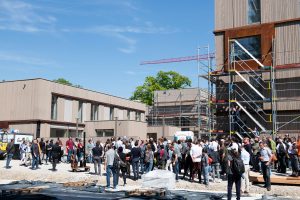 The Munich City Council's Committee for Urban Planning and Building Regulations has decided to promote the construction of new, contemporary timber construction projects. This year, the city council will develop a further subsidy programme for construction using wood and other renewable raw materials.
The grant programme is suitable for individual projects as well as larger housing estates and neighbourhoods. The aim of the city council is to ensure that around 50 per cent of the buildings on municipal land are constructed using timber.
The Munich City Council's Committee for Urban Planning and Building Regulations has decided to promote the construction of new, contemporary timber construction projects. This year, the city council will develop a further subsidy programme for construction using wood and other renewable raw materials.
The grant programme is suitable for individual projects as well as larger housing estates and neighbourhoods. The aim of the city council is to ensure that around 50 per cent of the buildings on municipal land are constructed using timber.
For almost fifteen years, Rob Hopkins has been developing a method for preparing our societies for the coming upheavals. Video: 5 min, available from 6.12.2019 to 8.12.2021
Senate adopts concrete measures for the next ten years and sets new CO2-targets for 2030 and 2050
 More than 30 mayors agreed on new strategic cornerstones for sustainability on Thursday, 14 November 2019. Among them is Bonn's Lord Mayor Ashok Sridharan. The city leaders want to expand the cities' scope for action and call for sustainable development to be placed at the heart of political decision-making.
More than 30 mayors agreed on new strategic cornerstones for sustainability on Thursday, 14 November 2019. Among them is Bonn's Lord Mayor Ashok Sridharan. The city leaders want to expand the cities' scope for action and call for sustainable development to be placed at the heart of political decision-making.
(6:25 min.) published on 5.11.2019 The city of Eschweiler (North Rhine-Westphalia) has been awarded the "Climate Active Municipality 2019" climate protection prize by the Federal Ministry for the Environment in Category 1: "Resource and energy efficiency in the municipality". The city of Eschweiler is committed to more resource and climate protection with its Factor X construction areas. The prize is awarded by the Federal Ministry for the Environment (BMU) as part of the National Climate Initiative (NKI), which is implemented by the German Institute of Urban Affairs gGmbh (Difu).
The call for proposals "City of the Future - Towards Plus-Energy Neighbourhoods" builds on previous experience from the research programme specific focus areas and R&D services. All stakeholders who are involved in research and development issues relating to buildings, neighbourhoods and cities and who want to tackle the new challenges of digitalisation in the construction industry, the realisation of plus-energy neighbourhoods and the development of innovative urban greening technologies can submit proposals. Around €8.3 million is available for the 7th call for proposals as part of the "City of the Future" programme. The call runs until 30 January 2020.

